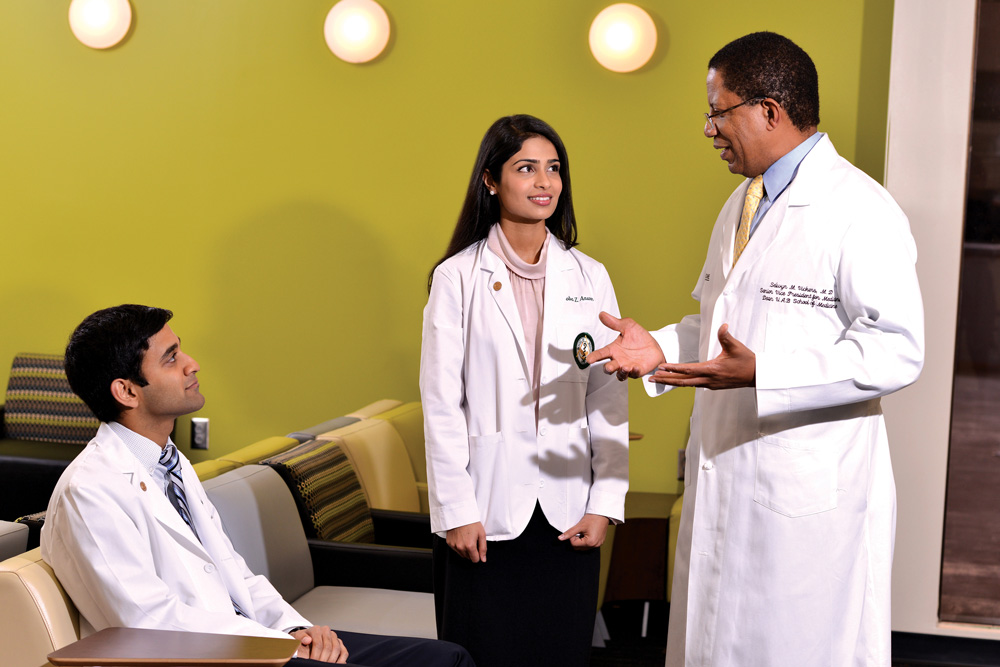 The UAB School of Medicine achieved the highest level of accreditation available to a medical school in the United States by the Liaison Committee on Medical Education after a rigorous, two-year self-study process that began in 2012 and culminated in a visit from the LCME site survey team March 9-12, 2014.
The UAB School of Medicine achieved the highest level of accreditation available to a medical school in the United States by the Liaison Committee on Medical Education after a rigorous, two-year self-study process that began in 2012 and culminated in a visit from the LCME site survey team March 9-12, 2014.In a letter sent to UAB President Ray L. Watts earlier this week, the LCME notified leaders of the accreditation status —valid for eight years— and commended the School of Medicine on its strengths in allowing the exploration of diverse aspects of medicine through student electives and in present and anticipated financial resources. The letter also noted the school’s ongoing efforts in diversity, especially in recruiting more female faculty, and in the continued development of the three branch campuses.
“We are very pleased by the LCME’s review of our medical school,” Selwyn M. Vickers, M.D., dean and senior vice president for Medicine, says. “Many people deserve credit for years of hard work, including Dr. Watts, who was dean when the LCME process began, and Dr. Anupam Agarwal, who continued leading the LCME efforts while interim dean and senior vice president." Vickers also credits professor and former dean Dr. Bob Rich and Dr. Hughes Evans, chair of the Department of Medical Education and senior associate dean for Education, for leading a small army of faculty and staff on a mission to achieve full accreditation.
“Full accreditation is a measure of the excellence of our faculty, students and staff. It is a point of pride for UAB, the Birmingham Region and the state of Alabama,” Vickers says. Roughly 85 percent of UAB medical students are from Alabama, and recent focus has aimed at increasing the ranks of primary care physicians in Alabama, especially in rural areas that face physician shortages, to complement the complete spectrum of surgical and medical subspecialties.
LCME accreditation is a peer-review process of quality assurance to determine if a medical school program located in the United States or Canada meets established standards in medical education. Full accreditation is not guaranteed, and many well-regarded schools receive less than a full eight years of re-accreditation.
Rich chaired the LCME executive committee, an eight-member group charged with oversight in the process, preparation the self-study and readying for the site visit. He says the hard work dedicated faculty, staff and students put into the re-accreditation process showed in UAB’s outcome.
“Receiving full accreditation is wonderful news; the limited areas for improvement noted is a strong affirmation and a great indicator of the quality of medical education at UAB,” Rich says. “We’re stronger than we were when the self-study process began. We took a long look at our institution and began making changes in areas where we felt there could be improvement, which is the whole point of the accreditation process.”
| “Full accreditation is a measure of the excellence of our faculty, students and staff. It is a point of pride for UAB, the Birmingham Region and the state of Alabama.” |
Representatives from each of the School of Medicine’s campuses were recruited to serve on committees in five dedicated areas—institutional setting, educational programs, educational resources, medical students and faculty—and each committee worked collectively with content experts to appropriately address questions and prepare the self-study database. Students from each class were also recruited to develop and lead an Independent Student Analysis, meeting separately with the committees to discuss the ISA findings and suggest improvements. UAB was specifically commended at the time of the Site Survey for the quality of the self-study and student analysis.
The LCME identified two areas the School of Medicine needs to address: the dependence on lectures, rather than self-directed or active learning, during the preclinical years; and reports that faculty observations of students’ core clinical skills are low in some clerkships.
Rich says plans are in place to address the two areas. A proposal from the Office of Undergraduate Medical Education to reduce the number of lectures during students’ pre-clinical years by 10 percent each year for two years was approved by the Medical Education Committee in February 2014—before the LCME site visit— and will be effective with the upcoming academic year. Rich said there is also a plan more communication between faculty and students regarding clinical skills observation during clerkship rotations.
School of Medicine leaders will submit a status report to LCME leadership next year to provide updates regarding the areas of concern. The next full survey for re-accreditation for the School of Medicine will take place in the 2021-2022 academic year.